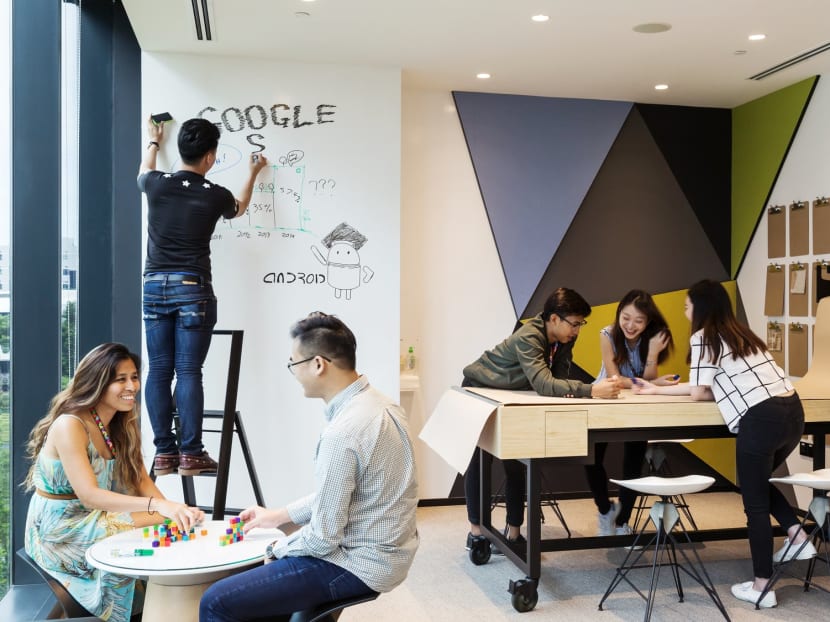Having fun at work is serious business
A core value of successful American on-line retailer Zappos is “create fun and a little weirdness”. The company, its management as well as its staff all take this seriously, and for good reason. Its approach holds some lessons for businesses, including those in Singapore.

Among other things, staff members at Google Singapore's office can make use of two foosball tables, a full-sized pool table and a huge Lego wall where they can build whatever they want onto the wall.
A core value of successful American on-line retailer Zappos is “create fun and a little weirdness”.
And the company, its management as well as its staff all take this seriously.
“Rather than being all corporate and boring like the other guys, we instead inject fun and humour into our daily work and surroundings,” it says on its website.
“Over the years this has come in the form of over-the-top Nerf gun battles, themed new hire parades, and even Tutu Tuesdays,” it adds.
“When you combine fun and weirdness in the office, it ends up being a win-win for everyone; employees become more engaged in the work that they do and the company as a whole becomes more innovative. Sure, it may be a bit unconventional, but hey, we wouldn’t have it any other way!”
It must be doing right. Zappos’ revenue has grown from some US$8 million (S$10.9 million) to over US$1 billion in the past nine years, and employee turnover is about 7 per cent per year, in an industry where average turnover is around 150 per cent.
For every job opening in the call centre, the number of applications is capped at 200 which is usually reached within hours of advertising a single job.
Why do people want to work at Zappos? Well, it’s fun.
And as American management professor Dr John Michel and his colleagues explained in an article in Human Resource Management Review, having fun improves our well-being.
It makes us feel more positive in the moment and, over time, this will translate to prolonged enthusiasm and energy for our work.
Organisations whose employees find fun in their work benefit from greater job satisfaction, engagement and commitment. Fun makes learning easier and promotes creativity and innovation.
So how do we strike a balance between serious work and having a more light-hearted moment in the office?
There are three types of fun at the workplace.
Organic fun emerges spontaneously from employees who are having a good time; it includes casual jokes and spur-of-the-moment merry making.
Managed fun includes organised events such as public celebrations, social outings, gift exchanges, and team-building.
Task fun is the enjoyment we get from the nature of the work that we do. Although we might not laugh out loud while immersed in our work, we can experience moments of joy and humour that keep a smile on our face.
So, why don’t we all just lighten up and tell more jokes, use more humour, and play around more at work?
Because organisations and their managers often see enjoyment as a distraction to “the serious work we do here”.
But it is time such attitudes change.
Companies should encourage employees to have fun or allow such a practice to thrive. It is ideal to do both, but not to “mandate fun”.
If employees feel that “fun events” have been forced on them, they may resent the activities and feel more negatively towards the organisation.
To actively encourage fun, employers can organise a range of non-compulsory events (managed fun) which might appeal to different employees. Better still, ask for volunteers to form a “committee for fun”.
For example, at the Asia-Pacific headquarters of Apple in Singapore, such committees organise movie nights, music concerts, "Olympic Games" and other friendly competitions between departments.
The trick is to be creative and inclusive, so that organic fun emerges.
For example, corporate cooking classes are popular in Singapore. But the practice of preparing food together does not have to be structured or expensive.
You can simply ask colleagues to bring their own ingredients for a culturally-diverse mass salad or batch of fried rice.
A shoe company could celebrate Women's Day by asking their male employees to wear high heels so that they can '' walk in women's shoes'' - literally and metaphorically.
This is not just to have a laugh, but to drive home the significance of a women's role at work.
To allow fun (especially organic fun), organisations have to provide resources where people can freely get together and share some activities.
For example, Google Singapore’s office has two foosball tables, a full-sized pool table and a huge Lego wall where employees can build whatever they want onto the wall, among other things.
Many Singapore companies now provide free food and drinks for employees.
Vault Dragon - an Electronic Medical Record (EMR) provider in Singapore – for instance provides an unlimited supply of beer and coffee for employees.
But companies can do more than just feed their staff.
Make use of common areas such as a tea room, a foyer, or a common corridor where people can stop to look and contribute in some fun way.
For example, you could have a “Wall of Fun Fame” where employees can post baby pictures of themselves or draw their own “doodles”.
For task fun, it is better to allow it than try to encourage it.
This comes down to good conversations with managers about “what do you enjoy in your job?” and supporting this as much as possible.
In Singapore, we have a culture of working hard, so it is important to consider how to have safe and productive fun at work so that we can thrive in such a work culture.
ABOUT THE AUTHOR:
Dr Stewart L Arnold is senior lecturer in Strategy, Management and Organisation at Nanyang Business School, Nanyang Technological University, where Janet Loh heads the College Communications.






